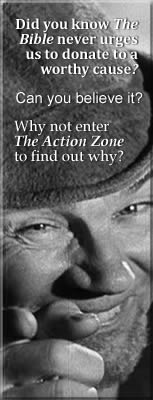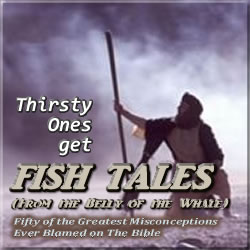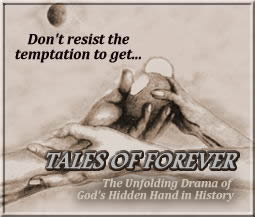Hollywood’s Debt to The Bible
In the Beginning
When Hollywood was just a twinkle in the eye of the movie pioneers who fled to the West, hoping to free themselves from the tyrannical Edison group that was attempting to control all film production, the first order of the day was to elevate their business beyond its reputation as a mere novelty. Known originally as the Nickelodeon, the industry desperately needed to distance itself from its childish origins and escape its association with the kinds of simplistic one-reel shorts that characterized the films being made in the first decade of the twentieth century. But what were these early filmmakers, with their meager supplies and modest beginnings, to do in the face of such odds? Quite simply, they would accomplish the task by injecting into their films one of the most ancient and fundamental elements known to mankind. The men who became moguls added to their elixir of celluloid, silver, and light one final ingredient—a great story, a compelling story, a human story. And when they did, what had previously been looked upon as child’s play began to take on a new life, one with a maturity, depth, and import as yet unmatched in the annals of artistic endeavor.
But where, exactly, did these individuals, who brought about this new phase in the history of movies, come upon this special ingredient of theirs? Was it one of their own creation? Did they design their unique narrative out of whole cloth? The answer might surprise some; yet others will naturally understand and accept the truth without a single argument. Because the truth is, the special ingredient that infused new life into the child of Hollywood was not at all a creation of the moguls who appropriated it. As a matter of fact, just as those early filmmakers notoriously appropriated the machinery created by others, they also freely appropriated the kinds of stories they needed to breathe new life into their motion pictures. As it so happens, the source I am speaking of is The Bible.
Story Continues Below
To hear Kent and Zen Garcia talk about correcting biblical misconceptions, from September 9th, 2021, CLICK BELOW.
Story Continues From Above
Among the more obvious reasons for this appropriation was that, first and foremost, the biblical narratives were unencumbered by any copyright claims. Already wearied by a decade-long legal battle over the fair use of the filmmaking equipment they were using, the newly organized community in Hollywood gravitated toward anything they could lay legal claim to without fear of further encumbrances upon their future success. Furthermore, the biblical stories were well known to have been exploited with great success by previous generations of authors and playwrights, most notably by such luminaries as Geoffrey Chaucer, William Shakespeare, John Milton, John Bunyan, Charlotte Bronte, Herman Melville, and Walt Whitman. Finally, and most importantly to the men who sought to generate capital gains from their efforts, the audiences they were trying to attract into their movie houses were thought to be more inclined to see a picture that was imbued with such tried-and-true elements found in The Bible, the most published book of all time. As Cecile B. DeMille, the creative force behind such classics as The Ten Commandments, King of Kings, and Samson and Delilah, once remarked, “Give me two pages from The Bible, and I’ll give you a motion picture.”
In 1914, when fledgling movie director D.W. Griffith set out to make his first feature film, he used a story straight from a biblical book in The Apocrypha. Entitled Judith of Bethulia, it’s the story of a widow who risks her life by offering herself as a sacrificial lamb. In a daring move, she seduces the sadistic general of an invading army, and in the process manages to slay him by the edge of the sword, thereby saving her people from destruction. Not only is it one of the earliest examples of a biblical tale being filmed as a full-length feature in America, but it’s also considered by many to be one of the first examples of Griffith’s directorial genius, which demonstrated his unique editorial style now world famous as the “classic Hollywood narrative,” one that is characterized by an editing process that grounds the audience in terms of characters’ filmic relationship with one another and their surroundings, in both their physical proximity and the chronology of the story itself.
Little wonder that as a result of Griffith’s success, filmmakers the world over took up the mantle to produce similarly worthy works, if not specifically told as tales lifted from The Bible then at the very least stories that clearly echoed themes, characters, and plots which did have their origins in it. So, whether one considers themselves a devotee of the silver screen or of the sacred Scriptures, they will naturally find themselves all too familiar with the sentiments and sensibilities that abundantly inhabit the environs of both worlds in…
… the man (or woman) with no name, who walks alone through a dust-filled landscape, seeking a justice that only they can perceive amidst the sandstorm of frontier hypocrisy, and by virtue of their single-minded determination, they blaze a fresh trail of hope and freedom for others to follow;
… the solitary searcher, who doggedly follows their own keen instincts in utter defiance of those sanctioned authorities that zealously oppose their tenacious pursuit of truth, and in the process of doing so, not only procures a new lease on life for those they represent but also helps to usher in a new standard of justice for their colleagues to live by;
… the beguiling con artist, who spends a lifetime bluffing their way from one hollow conquest to another until, finally faced with the realization of what they have become, they are brought to a crossroad where their first selfless act brings about a transformation that affects not only them but everyone else in their life;
… the wrongly accused one, who is forced to flee the ostensibly righteous judgment of a society that willingly blinds itself to their lonely plight, as they attempt to, against all odds, clear their good name, whereby their action saves not only them from a tragic miscarriage of justice but provides a safeguard from the same thing befalling anyone else in the future;
… the unassuming recluse, who, though apparently impotent in the face of overwhelming forces that have triggered his self-imposed exile, is finally able to rise to the challenge and become the hero he has always been capable of becoming;
… the lovable ne’er-do-well, who couldn’t care less about anyone else and their own dedication to accomplishing nothing in their lifetime, till one day an unexpected turn of events steers them in an entirely unique path of spiritual and personal fulfillment, not only for them but also for everyone around them;
… the unwitting wanderer, who stumbles into an uncharted dimension, where they suddenly find themself a stranger in a strange land, like a fish out of water, until eventually, through a series of trials and tribulations, they make their way home again and thereby bestow a new way of life upon the world they had, for a time, left behind;
… the hapless victim, who, despite every obstacle thrown their direction, turns the tide of mindless, inhuman circumstances into the very means by which they are in a newly-found position to become the lone avenger of every evil with which the enemy has sought, in the first place, to destroy them and their entire clan;
… the misunderstood outcast, who, in spite of having been thrust from the land of their birth, refuses to be defeated by any outside force, and who, by dint of a divinely inspired inward journey, thereby discovers their untapped potential in order to be received home yet again as the savior of their people.
All these and more are the kinds of characters which comprise our revered modern-day movie pantheon, but which were actually born in our ancient past, having first been introduced into the realm of our consciousness by way of the pages of the most important book ever penned by mankind: The Bible.





